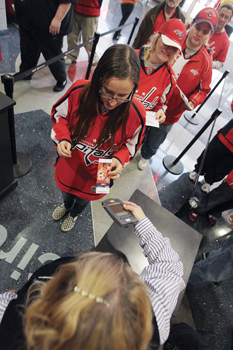Jim Van Stone, who is the senior vice president of ticket sales and service at Monumental Sports & Entertainment, found some startling results upon reviewing ticketing research on his Washington Capitals clientele early last year. He also saw an opportunity.
Upper-deck seating at most arenas, including the Capitals’ home, Verizon Center, has long been more of a value-oriented product, a place to put fans who just want to be in the building, weren’t concerned about status, or didn’t necessarily have entertaining needs for business clients.
But Van Stone, looking at detailed demographic and income information on his fan base, found that a large amount of Capitals ticket buyers in the upper seating bowl held six-figure incomes. Furthermore, they were also among some of the team’s most ardent fans, as shown by a variety of additional measures such as merchandise and secondary market ticket purchases, team website visits, survey participation and other indices.
 |
GETTY IMAGES
The Washington Capitals learned that some of their fans could spend more money to sit in the upper deck. |
With fan interest in the Capitals also peaking, thanks to the continued ascendancy of star forward Alex Ovechkin and a series of high-seed playoff appearances, Van Stone and Monumental used that data to devise a new price structure in which upper-deck seats that previously sold for $14 each on a full-season basis nearly doubled to $27 each. Higher-priced inventory in the upper deck received similarly large increases.
Consumer and public relations pushback from the price hikes were minimal and ticket renewal rates stayed in excess of 90 percent. But much more critically, the upper-deck bumps have created more than $1 million in incremental, annual ticket revenue for the team.
“Going through the data, we were really surprised by the number of people who could definitely afford to sit in the lower deck, but were staying upstairs,” said Van Stone, who is now implementing similar analytics for less-in-demand Washington Wizards and Mystics tickets. “There were a variety of reasons for that. A lot of them like to see the plays develop from that vantage point. But it really opened our eyes into who our fans really were and what they want to buy.”
Two hours up Interstate 95, the Philadelphia Flyers made a similar calculation. Perhaps even more so than the Capitals, the upper deck at Wells Fargo Center was full of die-hard fans with good amounts of disposable income. As a result, the Flyers’ ticket pricing sheet for the 2011-12 season looks like a rainbow, with each individual upper-deck row carrying a different price point. A low-to-mid seven-figure sum of incremental revenue will be generated from the new, highly segmented structure.
“The analytics have made all this possible,” said Peter Luukko, president and chief operating officer of Flyers parent Comcast-Spectacor. “Before, you sort of put your finger in your mouth and held it up in the air.”
Such is the state now of data mining in the ticketing world. All across the sports industry, teams, leagues and vendors are rapidly embracing the power of high-end research and analytics to boost ticket sales, still the single-largest individual revenue source within several sports.
Using many of the same advanced consumer profiling methods long the province of other industries such as consumer packaged goods, airlines and automobiles, sports entities are now building detailed mosaics of their consumers. As a result, ticket sales efforts that not long ago were still something of guesswork based mainly upon recent team performance, economic conditions and prior purchase histories are now highly targeted, more efficient affairs.
“Big data is what the next generation is going to be all about in a lot of ways,” said Ted Leonsis, chairman of
 |
GETTY IMAGES
The Philadelphia Flyers offered a wider range of ticket prices after studying data on their fans.
|
Monumental Sports & Entertainment, parent company of the Capitals, Wizards, Mystics and Verizon Center. “I’m looking at this organization more broadly as a platform for the betterment of this community, and we believe the data and the insights we can learn from our various consumer touchpoints are going to affect every part of the business.”
Manifestations of what Leonsis calls big data are nearly everywhere around the ticketing landscape. Ticketmaster, long the dominant player in the business, recently started a new high-profile business division called LiveAnalytics in partnership with Ohio-based technology firm Teradata Corp. that will provide demand forecasting, industry benchmarking and other outputs. Many competing primary and secondary ticketing outlets such as Veritix and StubHub have their own growing analytics components.
Third-party providers of ticket analytics and lead scoring, meanwhile, such as Turnkey Sports & Entertainment and StratBridge, are experiencing their own mushrooming growth. And within the teams themselves, many clubs are hiring full-time data analytics staffers to help spot ticketing trends and make pricing and marketing recommendations. Monumental Sports & Entertainment themselves made such a hire earlier this month, bringing on Josh Brickman from Turnkey to be their manager of ticketing analytics.
“It’s now a really exciting time for sales modeling,” said David Highhill, product director for Turnkey’s ticketing analytics product, Prospector, and Brickman’s former colleague. “So many things that we do in our daily lives are now digitized and are easily trackable, and the technology is now there to help us really get into it. People understand the need now to collect data, but are still not exactly sure what to do with it.”
The new fan profile
The Charlotte Bobcats two years ago were at a crossroads. Facing a slumping economy, growing fan unrest and eroding ticket sales amid five straight losing seasons, team executives began to embrace database-driven methods for their marketing and ticket sales. Feeling there was little more to be gained through traditional efforts, the team spent much of the 2009-10 NBA season simply collecting data.
The Bobcats continued to gather the information they and most other teams typically have done, basic data such as names, phone numbers, physical and email addresses, and ticket purchase histories. But that data was soon joined by website browsing and merchandise buying patterns and survey responses.
And the true mother lode of information came from Acxiom Corp., a data partner of Turnkey’s that provided a wealth of demographic information such as income ranges, the type of cars prospective ticket purchasers drive, home values, education levels, and the number of children they have. Acxiom, one of the largest and most influential companies many Americans have not heard of, pools the content from a variety of public and tax records, survey and census data, and commercially supplied material.
 |
NBAE / GETTY IMAGES
The Charlotte Bobcats have used data to create profiles for ticket sales prospects. |
All of that information, in turn, is blended using proprietary algorithms to create a profile for each sales prospect. Fans are then segmented into various groups with names such as “Established Elite,” “Savvy Singles,” “Apple Pie Families,” and “Soccer and SUVs.” And those groups, in turn, were used to create far more targeted sales efforts. Leads are also scored on a one-to-five basis, five being the highest rating and most likely to purchase.
The result of the new fan profiling for the Bobcats was a 21 percent increase in season-ticket sales to more than 8,500 full-season equivalents and a seismic increase in sales close rates from about 0.5 percent of calls to more than 4 percent. A surprise playoff appearance and the installation last year of NBA legend Michael Jordan as team owner certainly helped boost the numbers. But after a disappointing, non-playoff 2010-11 season, renewal rates and new sales for next season remain ahead of previous years’ paces, even with the specter of a likely NBA work stoppage and higher lower-bowl ticket prices.
“We knew if we had any chance to succeed in this market, we simply needed more data,” said Pete Guelli, Bobcats executive vice president and chief sales and marketing officer. “Two years ago, we were not in the database space at all, and now, it’s our primary means of reaching out. Being able to segment and cluster our customers has made us much more efficient.”
A different approach
At Ticketmaster, the embrace of big data is nothing less than a total mind-shift in how the company thinks and operates. Previously structured as essentially a software solutions company, LiveAnalytics represents a major step toward repositioning Ticketmaster as a full-service ticket sales and marketing entity.
Like its competitors, LiveAnalytics is blending purchase histories with website browsing behaviors, demographic data and other inputs, and developing specific algorithms to blend all that data and create sales prospects and demand forecasts. Early clients include the Los Angeles Dodgers and several other undisclosed MLB teams.
But only a few months into the effort, Ticketmaster has already learned that simply collecting and analyzing data is not enough. Presentation tools for time-strapped sales executives are just as important, if not more so, to turn that information into actual results. Because of that, LiveAnalytics is following an emerging trend toward “dashboarding” the new information.
“Presentation design is critically important. We need this data to not become another doorstop,” said John Forese, Ticketmaster’s senior vice president of data services and head of the LiveAnalytics effort. “So we’re putting a lot of emphasis on the ease and accessibility of the data.”
Dynamic future
The advanced ticket analytics are being used primarily for new season-ticket sales and retention efforts, each of which are traditionally administered by human sales representatives. But key next steps will come in two other areas: dynamic pricing that continues to rapidly grow in popularity, and automated sales efforts that will reach out to fans while browsing for tickets online.
Veritix is developing several analytics-based tools that will reach out to fans while on various team webpages and ticketing sites, either through pop-up ads, email offers or upsells directly on a team ticketing page. For example, a fan purchasing an upper-deck ticket from an Internet IP address located in a high-income ZIP code may receive an upsell offer for a lower-bowl or premium-level ticket. Such marketing efforts have been done for years by airlines, car rental companies and similar industries, but only now are gaining wide favor within sports.
“What we want is to be able to extend the same kind of elevated close rates we see offline with these tools and have them work even when a consumer is in a self-purchase environment,” said Sam Gerace, Veritix chief executive.
The data embrace is also a key step toward more widespread use of dynamic pricing structures. After early success by trailblazers such as the San Francisco Giants, dozens of teams are now dabbling in dynamic pricing, using analytics to help set daily or weekly prices schedules. Forese and LiveAnalytics are working with four MLB teams on an early-stage basis to create dynamic pricing models. Van Stone, after working for several years in more rigid variable pricing structures for the Capitals and Wizards, is planning to use dynamic models for both teams starting this fall.
“That’s the next big hope for us,” Van Stone said. “We’re looking at the business very similar to the airlines, and believe there’s even more incremental opportunity there.”






